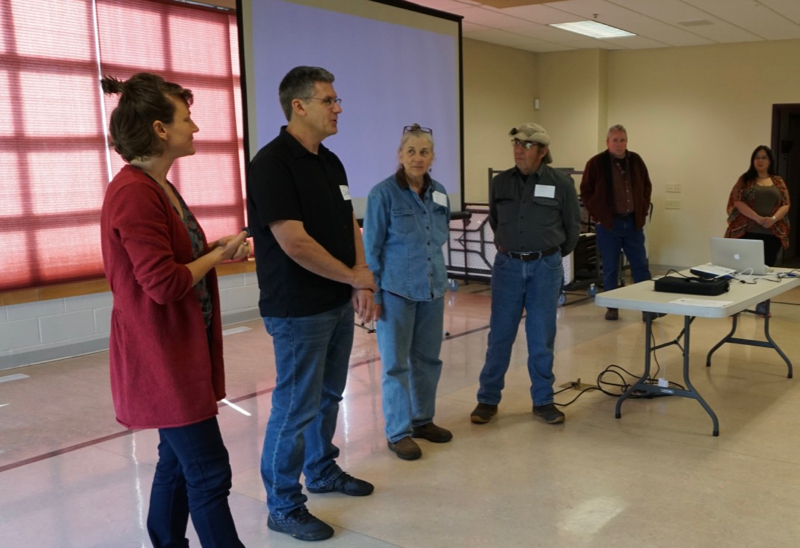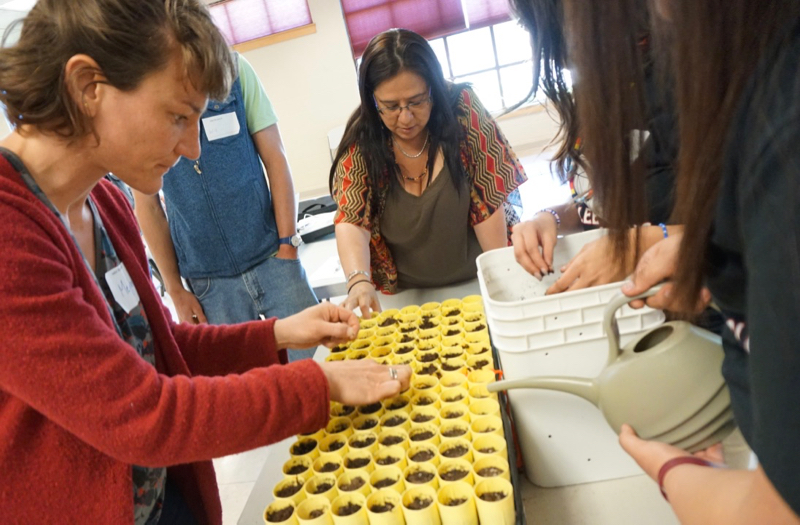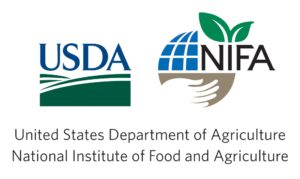NWAL researchers and teachers develop localized science lessons for Native American Classrooms
/3 Comments/in Events, News /by Kelsey FitzgeraldNWAL holds weather station installation and climate resilience workshop with Hopi Tribe
/1 Comment/in Events, News /by Kelsey FitzgeraldNWAL holds Arizona climate workshops with the Navajo Tribe
/1 Comment/in Events, News /by Kelsey FitzgeraldThe 2018 NWAL Tribal Summit: Event Recap and Photo Gallery
/1 Comment/in Events, News, Project update /by Kelsey FitzgeraldEvent recap: 2018 Youth Day at the Desert Research Institute
/1 Comment/in Events, News, Project update /by Kelsey FitzgeraldNWAL holds Youth Day event at Salish Kootenai College
/20 Comments/in Events, News /by Kelsey FitzgeraldOn a sunny Thursday morning in early May, twelve students from local high schools of the Confederated Salish and Kootenai Tribes of the Flathead Reservation in western Montana gathered in the fitness center cafeteria at Salish Kootenai College (SKC) for an event called “Youth Day.” The students were welcomed to the event by SKC president Dr. Sandra Boham.
“You really are going to be the next leaders in our communities,” Boham told them. “We need you. We need you here, and we need you in our future. I am always looking for who will be the next president of SKC, the next biology instructor, the next tribal attorney, the next principal for Polson School District. Who will be the next people run the dam and monitor the fish. It’s going to be you.”
Youth Day, a one-day event organized by researchers and educators from the Native Waters on Arid Lands (NWAL) project team, aimed to provide opportunities for meaningful dialogue and learning around the themes of climate change, adaptation, water and agriculture. The event agenda included an interactive “climate myths versus facts” session with NWAL education lead Meghan Collins; an outdoor dendrochronology lecture and tree-coring demo by Dr. Rick Everett, Professor of Forestry at SKC; a hands-on planting activity in a native plant restoration site on campus with SKC Extension Director Virgil Dupuis, and more.

NWAL team members Meghan Collins, Derek Kauneckis, Anna Eichner, Scott Goode, Virgil Dupuis (SKC) and Mary Rose Morigeu (Confederated Salish and Kootenai Tribes) welcome participants to Youth Day, May 3, 2018.
“The discussion topics stemmed directly from the core themes of NWAL as a project – food, water and climate,” Collins explained. “We also worked really closely with SKC extension agent Virgil Dupuis to set up an agenda that we thought would be meaningful for the students and would resonate with their activities and future goals.”
The idea for this event was sparked via feedback from participants at NWAL’s Tribal Summit. The Tribal Summit is an annual event that gathers members from tribes across the western U.S. for two days of talks, workshops and two-way dialogue about issues on reservations and tribal lands related to climate change, agriculture, ranching, water resources, economics, and other topics of interest.
“Feedback from the Tribal Summit said, over and over again, that we cannot be talking about issues of climate without engaging our youth,” Collins said.
As such, Youth Day was designed not only as an opportunity for the NWAL team to teach the students, but to learn from them as well.
In the early afternoon, a group of five students from the Arlee EAGLES club – a student-run environmental advocacy club from Arlee High School located on the Flathead Reservation – stood before the group, teaching event attendees how to plant seeds of native Chokecherry and Twinberry in long, yellow, tube-shaped pots.

Meghan Collins (NWAL Education Lead) and Mary Rose Morigeau (Confederated Salish and Kootenai Tribes) learn native seed planting techniques from students from the Arlee EAGLES Club at NWAL Youth Day, Salish Kootenai College. May 3, 2018.
A shallow hole for the seed, a sprinkle of peat moss on top, and a little water, the Arlee students explained, as youth from other nearby schools of the Flathead Reservation, other tribal members, and members of the NWAL team circled around to try for themselves.
The Arlee students also presented an array of environmental projects that they had undertaken at their school, including a school-wide recycling program, a greenhouse, and an impressive effort to monitor emissions generated by their school’s coal-powered heating system. The students hope to use the emissions data to convince their local school board to change energy generation at their school to a cleaner and more sustainable system.
Youth Day concluded with a discussion and presentation by NWAL team member Scott Goode on a new approach for in-ground composting and sustainable gardening that also helps sequester carbon from the atmosphere, and a visit to the SKC vegetable garden plot.
“I really enjoyed learning about the composting system,” said Margaret Sansavere, a junior at Arlee High School and member of the Arlee EAGLES club. “I never thought about putting in-ground trenches of compost into a garden. It really inspired me to try to get my peers involved and changed my perspective on gardening.”
Youth Day at SKC was the second ‘Youth Day’ event hosted by the NWAL project; the first was held at the Desert Research Institute in Reno, Nev. in November 2017. Both events provided valuable opportunities for sharing knowledge and ideas across generations.
“This was a fantastic day of two-way dialogue,” Collins said. “The students really inspired our faculty and experts, and I hope that the students also came away with some new ideas for the projects that they are taking on at home.”
Additional NWAL Youth Day events are planned with Native students from Paiute and Shoshone Tribes in Nevada and Navajo Nation, Hopi and other Pueblo communities in Arizona and New Mexico.
Upcoming events: Youth Day and R Short Course at Salish Kootenai College – May 3-5, 2018
/19 Comments/in Events, News, Project update /by Kelsey FitzgeraldThe Native Waters on Arid Lands (NWAL) team is pleased to announce two events that will take place May 3-5, 2018 at Salish Kootenai College (SKC) on the Flathead reservation in western Montana. The events include:
- May 3, 2018: Youth Day with SKC and NWAL faculty and high-school students from the Confederated Salish and Kootenai Tribes (CSKT).
- May 3-5, 2018: Short Course on R for Environmental Analysis (view flyer) focusing on environmental data and analysis on the Flathead reservation and targeted towards SKC faculty, students, and CSKT resource managers.
Event Details
Thursday, May 3, 2018 — SKC Youth Day
Organized by Meghan Collins and Virgil Dupuis
Modeled after a highly successful Youth Day held at DRI in November, 2017, the SKC Youth Day will consist of a full day of activities around the themes of landscape, environment, and sustainability. Participants will be from the EAGLES—Environmental Advocates for Global and Ecological Sustainability—a grades 10–12 student club organized by the CSKT. EAGLES students will engage with SKC faculty and NWAL scientists in activities that connect traditional values and knowledge to sustainability and resilience.
Currently scheduled sessions and session leaders include:
- Geo-cultural landscape of the Flathead basin — walk and look around tour on SKC campus (Tony Berthelote, SKC)
- Tree-ring records for climatology, fire history, and forest health (Rick Everett, SKC)
- Climate Myths versus Facts (Meghan Collins, DRI)
- The importance of values in debating carbon draw-down strategies—in-ground composting for sustainable gardens demonstration/participation (Scott Goode/Anna Eichner, DRI/Nourishing Systems)
- Native plants and restoration — participation in a native plant restoration project on SKC’s campus (Virgil Dupuis, SKC)
Friday & Saturday, May 3–5, 2018 — Short Course in R for Environmental Analysis
Organized by Kyle Bocinsky, Tracy Bowerman, and Christine Albano
This three-day, intensive short course will focus on transferring environmental knowledge and skills to SKC faculty, students, and CSKT resource managers. Conversations with SKC staff have revealed a need for training in open-source tools for GIS and environmental analysis, and for the dissemination of knowledge about where to retrieve environmental data for their local communities, and the skills necessary to process and analyse those data. The short course will be an introduction to the R statistical language and its geospatial and geostatistical capabilities. Participants will learn how to import, manipulate, and graph tabular data in R; calculate summary statistics for those data; import spatial data including point, line, polygon and gridded data; perform basic geospatial information system actions like cropping, masking, and dissolving geometries, and calculating statistics about spatial objects; and visualizing spatial data using interactive web maps. Participants will be introduced to several publicly available environmental datasets including the USDA-NRCS SSURGO soils data; elevation, hydrography, landcover, and boundary data from the US National Map; and the NorWeST stream temperature database which is especially important for monitoring fisheries on the Flathead reservation and across Montana. Short course participants will receive a set of training scripts tailored to the Flathead reservation for analyzing these environmental data. Dr. Tracy Bowerman, professor of Wildlife and Fisheries at SKC, will co-develop the short course with NWAL team members Kyle Bocinsky and Christine Albano. Due to Dr. Bowerman’s initiative, we expect to be able to offer this short course to SKC students for college credit, and we are planning for broad participation of 20–25 people.
About
The Native Waters on Arid Lands project seeks to enhance the climate resiliency of agriculture on American Indian lands of the Great Basin and Southwest by building the capacity within tribal communities to develop and implement reservation-wide plans, policies, and practices to support sustainable agriculture and water management.
Business Hours
Our support Hotline is available 24 Hours a day: (555) 343 456 7891
- Monday-Friday: 9am to 5pm
- Saturday: 10am to 2pm
- Sunday: Closed
Latest News
 Rainwater Harvesting on the Hualapai Reservation: New Research by Brianda Hernandez RosalesAugust 1, 2022 - 10:41 pm
Rainwater Harvesting on the Hualapai Reservation: New Research by Brianda Hernandez RosalesAugust 1, 2022 - 10:41 pm Maureen McCarthy/DRINew USDA Grant to Support Climate Resilience Planning in Indian CountryJanuary 13, 2022 - 5:59 pm
Maureen McCarthy/DRINew USDA Grant to Support Climate Resilience Planning in Indian CountryJanuary 13, 2022 - 5:59 pm- Presentations from FALCON Conference now availableDecember 14, 2021 - 8:13 pm

